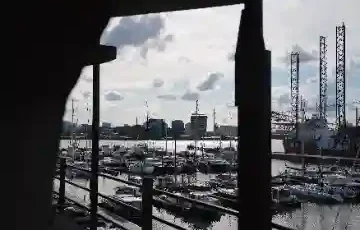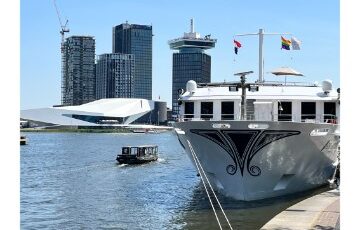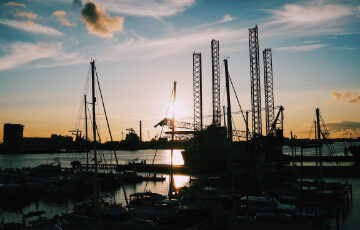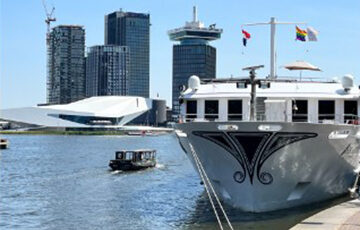Transportation law encompasses all legal regulations governing the movement of goods and passengers by road, water, rail and air. This legal domain regulates liability, transport agreements, freight forwarding, storage and the rights of all parties in the logistics chain according to the Dutch Civil Code and international conventions such as the CMR Convention.
Dutch transportation law forms the legal backbone of one of the most important economic sectors. With Rotterdam as Europe’s largest port and a strategic location, the Netherlands plays a crucial role in international trade. Transport companies, freight forwarders and shippers deal daily with complex legal issues that must be resolved quickly to prevent disruption. Cargo damage, contract breach or liability matters can lead to substantial financial losses within hours.
The sector is characterized by a dynamic nature where contracts are often concluded under time pressure. Therefore, knowledge of legal frameworks is essential. This article provides insight into the key aspects of transportation law, from transport agreements to liability and from freight forwarding to international regulations.
What legal areas fall under Dutch transportation law?
Transportation law consists of multiple legal disciplines: transport law (road transport, inland navigation, maritime shipping, air transport), freight forwarding law, storage law, customs law and liability law. Each transport modality has its own legal frameworks such as the CMR Convention for road transport and the Montreal Convention for air transport.
Road transport falls under the CMR Convention (Convention relative au contrat de transport international de Marchandises par Route), which regulates carrier liability. This convention applies automatically to international road transport and limits liability to a maximum of 8.33 SDR per kilogram of damaged or missing cargo. Additionally, General Transport Conditions (AVC) play a role in domestic transport.
Inland navigation is regulated by the CMNI Convention, while maritime shipping falls under international conventions such as the Hague-Visby Rules. Air transport operates under the Montreal Convention as its legal framework. Each modality has specific rules for liability, insurance and dispute resolution.
Freight forwarding law regulates the position of the freight forwarder who arranges transport orders on behalf of the principal without conducting transport themselves. The Dutch Forwarding Conditions (FENEX) typically determine legal relationships. Customs law plays a crucial role in cross-border transport, with strict rules for declaration obligations and product regulations according to the Union Customs Code.
Dutch liability law determines who is responsible for damage during transport. Distinction exists between contractual liability (between parties with an agreement) and non-contractual liability (such as traffic accidents). Insurance law forms an important complementary legal area, as transport insurance often contains complex clauses regarding coverage and exclusions.
How does a transport agreement work under Dutch law?
A transport agreement arises when a carrier commits to transporting goods or persons in exchange for payment. According to Article 8:1100 Dutch Civil Code and Article 8:1690 Dutch Civil Code for goods transport, this agreement arises once both parties reach consensus on transport, cargo and price.
For goods transport, the carrier must deliver goods undamaged to the agreed destination within a reasonable timeframe. The consignor has obligations such as correct delivery, proper documentation and timely information about hazardous substances. A consignment note or electronic shipping form serves as proof of the transport agreement.
General conditions play an important role. Carriers often apply standard conditions such as AVC or FENEX conditions that limit liability. According to Article 6:233 Dutch Civil Code, these conditions must be clearly agreed upon and may not contain unreasonably onerous clauses according to general conditions rules.
Practice example: A transport company from Rotterdam accepts an order to transport 15,000 kg of electronics to Germany for € 2,500. During transport, fire breaks out due to a technical defect in the truck, causing complete cargo loss. The value amounts to € 180,000. However, based on the CMR Convention, liability is limited to a maximum of 8.33 SDR per kilogram, amounting to approximately € 140,000. The shipper should have taken out additional cargo insurance.
Transport orders can be subcontracted to sub-carriers. However, the main carrier remains liable toward the principal. Identity fraud on digital transport platforms creates legal problems when a sub-carrier with false identity disappears with valuable cargo.
What is the difference between carrier and freight forwarder in the Netherlands?
A carrier performs physical transport and bears risk for cargo, while a freight forwarder organizes transport orders on behalf of the principal without conducting transport themselves. According to Article 8:60 Dutch Civil Code, freight forwarders have a duty of care but more limited liability than carriers.
Carriers are liable for damage from the moment of receipt until delivery. This liability is strongly regulated in international conventions. A carrier can only exonerate themselves under strict conditions, for example in cases of force majeure or defects in the cargo itself.
Freight forwarders organize transport chains, select carriers and arrange customs formalities. They act as intermediaries and according to FENEX conditions typically receive lower liability than carriers. The Dutch Forwarding Conditions limit liability to 2 SDR per kilogram or maximum € 3,500 per event, unless special arrangements apply.
Customs forwarders have a specific role in cross-border transport. They handle customs declarations and are responsible for correct information. With incorrect declarations, both the forwarder and principal can be liable for customs debts and fines according to the General Customs Act.
Storage companies form a third category. They store goods and have a custodian duty according to Article 7:600 Dutch Civil Code. This duty includes careful storage, administration and delivery only to the rightful party. Right of retention can arise when storage costs remain unpaid.
Which liability rules apply to cargo damage under Dutch law?
For cargo damage, liability depends on transport modality and applicable convention. The CMR Convention for road transport recognizes strict liability with limited exoneration possibilities and maximum compensation of 8.33 SDR per kilogram damaged cargo according to Article 23 CMR.
Carriers bear the burden of proof. They must demonstrate that damage arose from one of the exhaustive exoneration grounds: act of the rightful party, defect in the goods themselves, force majeure or special risks with certain goods types. This burden of proof weighs heavily, resulting in carriers remaining liable in 75% of damage cases.
Deadlines are crucial. Damage must be reported in writing to the carrier within 7 days after delivery. For delay, a 21-day period applies. Without timely notification, the right to compensation often lapses, unless the carrier acted in bad faith.
Underinsurance constitutes a common problem. Because CMR liability is limited, a substantial portion of damage often remains uncovered. Shippers can take out additional cargo insurance to cover the difference between actual value and CMR compensation. Premiums typically range between 0.1% and 0.5% of cargo value.
Statistics: Research shows that approximately 60% of transport damage is caused by insufficient packaging or stowage, 25% by traffic accidents and 15% by theft or vandalism. Preventive measures such as GPS tracking and adequate packaging reduce damage amounts by an average of 40%.
With multimodal transport (combination of transport modalities), the applicable convention for the phase in which damage occurred applies. Proof of the exact moment of damage is therefore essential. Freight forwarders organizing multimodal transport orders can include uniform rules in their general conditions.
How do you arrange transport agreements with international parties in the Netherlands?
International transport contracts require clear agreements on applicable law, competent court and transport conditions. The CMR Convention applies automatically to cross-border road transport between convention countries, but additional contractual agreements on matters such as payment and deadlines remain essential.
Incoterms determine who is responsible for transport, insurance and risk transfer. With EXW (Ex Works), the buyer bears all risk from collection, while with DDP (Delivered Duty Paid), the seller remains responsible until delivery at destination. Approximately 85% of international trade transactions use Incoterms to prevent misunderstandings.
Choice of applicable law influences legal position. Parties can choose Dutch law, but in the absence of choice of law, the Rome I Regulation determines which law applies. This regulation typically links the agreement to the country where the service provider has their principal establishment.
Forum selection regulates which court has jurisdiction in disputes. Companies often choose arbitration through specialized institutions such as the Arbitration Board for Transport Companies. Arbitration offers speed, confidentiality and enforcement via the New York Convention in more than 160 countries.
Payment terms deserve extra attention. Advance payment or bank guarantees protect against non-payment. Documentary credits through banks offer certainty that payment occurs once transport documents are submitted. This method is used in approximately 15% of international trade transactions with unknown parties.
Sanctions law plays an increasing role. European and American sanctions against certain countries often prohibit transport of specific goods. Violations lead to criminal prosecution and high fines. Carriers must verify in advance whether cargo, destination and parties involved fall under sanctions regimes.
What are your rights and duties as principal under Dutch law?
Principals have an information duty regarding nature, weight and hazards of cargo according to Article 8:1102 Dutch Civil Code and Article 11 CMR. Incorrect information leads to liability for damage to transport vehicle, other cargo or persons, regardless of general conditions.
Timely delivery is essential. Delay in offering cargo can lead to waiting charges or cancellation costs. Many transport contracts charge € 50 to € 150 per hour waiting time after a free period of 2 hours. With definitive cancellation within 24 hours before scheduled loading, compensation often amounts to 50% of the agreed freight price.
Correct documentation prevents customs problems. The principal must provide CMR consignment note, invoices, certificates and any import licenses. Errors lead to border delays and possibly customs fines that the principal must pay.
Payment obligation arises once the carrier correctly executes the order, regardless of whether the consignee accepts the goods. Payment terms vary but typically range from 14 to 30 days. With non-payment, carriers can exercise their right of retention and hold goods until payment.
Do you want certainty about your rights and obligations in transport agreements? Specialized lawyers analyze your contracts and advise on optimal conditions that protect your interests in both domestic and international transport.
Insurance choices rest with the principal, unless agreed otherwise. The limited CMR liability makes additional insurance necessary for valuable cargo. Cargo insurers typically cover up to full commercial value, with premiums depending on goods type, route and security measures.
How does dispute resolution work in transport cases under Dutch law?
Transport disputes can be submitted to regular courts, arbitration or mediation. Arbitration through the Arbitration Board for Transport Companies offers rapid resolution within 6 months with binding decision, while court proceedings take 12 to 18 months.
Arbitration has important advantages. Arbitrators often have specialized knowledge of transportation law and practice. Proceedings proceed confidentially, preventing reputational damage. Awards are internationally enforceable via the 1958 New York Convention, enabling enforcement in more than 160 countries.
Mediation offers a faster and cheaper alternative. An independent mediator guides parties toward mutual agreement. This method succeeds in approximately 70% of cases and costs on average € 2,000 to € 5,000, compared to € 15,000 to € 50,000 for arbitration or court proceedings.
Provisional attachment constitutes an important legal remedy with non-payment or flight risk. Creditors can attach trucks, trailers or goods through the subdistrict court. This attachment serves as security until the main case is decided. Court fees start from € 127 for a provisional attachment request.
Enforceable titles such as judgments or arbitral awards can be executed through the bailiff. For cross-border execution within the EU, the European Enforcement Regulation applies, making Dutch judgments directly enforceable in other EU countries without intervention of foreign courts.
Limitation occurs after one year according to Article 32 CMR for road transport. This short period requires quick action with damage or non-payment. For other legal areas within transport, longer periods of 5 years often apply according to Article 3:306 Dutch Civil Code, but specific conventions may deviate.
What role does customs law play in transport according to Dutch legislation?
Customs law regulates import, export and transit of goods across EU borders according to the Union Customs Code (UCC). Carriers and freight forwarders have declaration obligations and are co-responsible for correct customs formalities, with fines up to € 100,000 for violations according to the General Customs Act.
Customs declaration must be submitted electronically via EMCS (Excise Movement and Control System) or NCTS (New Computerised Transit System). These systems register goods during border crossing. Incomplete or incorrect declarations lead to inspections, delays and possibly criminal prosecution for smuggling.
Customs value determines due import duties. This value includes product price, transport costs to the EU border and insurance. With successive sales, the transaction value of the first sale to an EU importer applies as customs value according to Court of Justice jurisprudence.
AEO status (Authorised Economic Operator) offers advantages such as reduced physical inspections, faster customs procedures and lower securities. This status requires a reliable track record, adequate administration and sufficient financial solvency. Approximately 15,000 Dutch companies have AEO certification.
Sanctions law directly affects customs. Goods destined for sanctioned countries or persons are detained. The Human Environment and Transport Inspectorate (ILT) strictly enforces these rules, with fines from € 25,000 for first violations and criminal prosecution for recidivism.
Product regulations such as REACH, CE marking and food safety requirements must be complied with. The Netherlands Food and Consumer Product Safety Authority (NVWA) inspects imported goods for compliance. Non-conforming products are refused or destroyed, with all costs for the importer’s account.
How does technology influence transportation law in the Netherlands?
Digitalization transforms transportation law through electronic consignment notes, blockchain for document flows and GPS tracking for liability evidence. The e-CMR protocol makes digital consignment notes legally equivalent to paper documents since 2008 according to additional protocols to the CMR Convention.
Electronic consignment notes accelerate administration and reduce errors. Drivers scan QR codes during loading and unloading, making real-time information available. Approximately 40% of European carriers now use e-CMR, with savings of € 6 to € 12 per shipment.
Blockchain technology offers transparency in logistics chains. Smart contracts automate payments once conditions are fulfilled, such as delivery at location. This reduces the risk of non-payment and disputes. Pilot projects in Rotterdam show efficiency gains of 30% with container handling.
GPS tracking delivers evidence in disputes over delay or route deviations. Telematics systems register location, speed, driving and rest times. This data is usable in legal proceedings as objective evidence, but privacy legislation (GDPR) imposes requirements on data processing and retention periods.
Digital platforms for spot freight create new legal issues. Identity fraud occurs when malicious parties pose as reliable carriers. Platform operators have a duty of care to verify users. With damage from fraud, they can be co-responsible if verification was insufficient.
Cybersecurity becomes crucial. Ransomware attacks on transport systems lead to disruption and millions in losses. Companies must take appropriate technical measures according to GDPR. With data breaches, reporting obligation within 72 hours to the Dutch Data Protection Authority applies, with fines up to € 20 million or 4% of annual turnover.
What are employment law aspects in transport under Dutch law?
Transport companies deal with specific employment law rules such as driving and rest times according to Regulation (EC) 561/2006, tachograph obligation and chain liability for wages with deployment of foreign drivers according to the Bogus Arrangements Tackling Act.
Driving and rest times are strictly regulated. Drivers may drive a maximum of 9 hours per day (twice per week 10 hours), with mandatory breaks of 45 minutes after 4.5 hours of driving. Weekly maximum is 56 hours, with a maximum of 90 hours per two weeks. Violations lead to fines from € 190 per driver.
Cabotage rules limit domestic transport by foreign carriers. After cross-border transport, a maximum of 3 cabotage trips are allowed within 7 days. Violation leads to fines of € 4,500 per trip and possible withdrawal of the transport license.
Posted workers must receive the minimum wage and employment conditions of the receiving country according to the Posting of Workers Directive. Dutch transport companies deploying foreign drivers are liable for compliance. The Labour Inspectorate enforces this with fines up to € 12,000 per posted worker.
Self-employed drivers constitute a risk area. The Deregulation of Assessment of Employment Relationships Act and jurisprudence impose strict requirements on genuine independence. With bogus self-employment, an employment relationship exists with all employment law and tax consequences. Reassessments of payroll tax and contributions can reach 50% of invoiced amounts over multiple years.
Contact specialized lawyers for advice on employment law compliance, optimization of employment contracts and guidance during inspections by ILT or Labour Inspectorate in your transport company.
Collective labour agreements such as the CLA Professional Goods Transport determine employment conditions for approximately 60,000 employees. This CLA regulates wages, irregularity allowance, vacation days and pension accrual. Non-compliance leads to claims from trade unions and individual employees.
Which environmental and safety rules apply to transport in the Netherlands?
Transport companies must comply with emission standards (Euro 6), permit requirements for hazardous substances according to ADR regulations and environmental zone schemes in urban areas. Violations lead to operation bans, fines and criminal liability according to the Economic Offences Act.
ADR rules (Accord européen relatif au transport international des marchandises Dangereuses par Route) impose strict requirements on transport of hazardous substances. Drivers must have an ADR certificate, vehicles require special equipment and signage, and routes must avoid tunnels with restrictions. Fines for violations start from € 450.
Emission reduction is enforced through environmental zones. Cities such as Amsterdam, Rotterdam and Utrecht prohibit access for trucks below Euro 4 or Euro 5. From 2025, only Euro 6 standards apply in various cities. Enforcement occurs through cameras with automatic license plate recognition, with fines of € 250 per violation.
Zero Emission Zones emerge from 2025 in multiple city centers. These zones are only accessible for electric or hydrogen vehicles. Logistics service providers must invest in emission-free vehicles or collaborate with specialized urban distribution operators.
BRZO regulations (Major Accidents Risks Decree) apply to storage and handling of large quantities of hazardous substances. Companies must prepare safety reports, have external safety plans and report incidents to ILT. Non-compliance leads to operation ban and fines up to € 100,000.
Waste transport requires specific permits according to the European Waste Shipment Regulation (WSR). This regulation, revised in 2024, focuses on circular economy within European borders and is strict for waste transport to non-EU countries. Illegal waste transport is an environmental crime with prison sentences up to 6 years.
Transportation law forms a complex and dynamic legal framework essential to the Dutch economy. From transport agreements to liability, from customs formalities to employment law – each aspect requires specialist knowledge and up-to-date understanding of legislation and regulations. Companies active in transport and logistics benefit from proactive legal advice to minimize risks, prevent disputes and comply with all legal obligations. Quick action on legal problems prevents disruption and limits damage, which in this sector is crucial for continuity and profitability.









